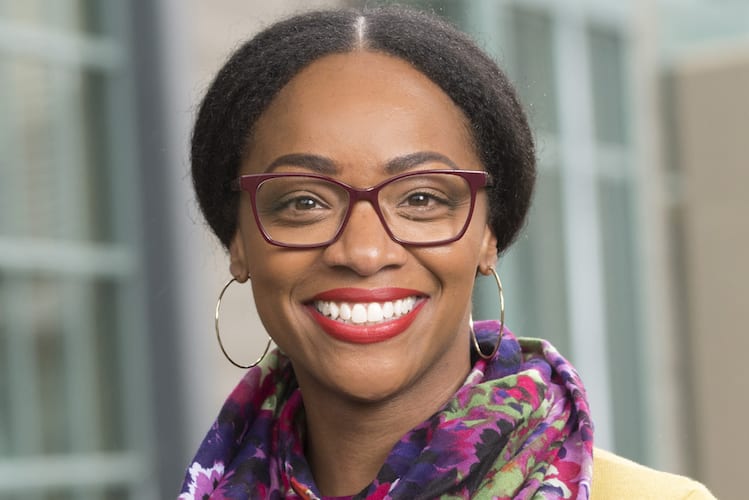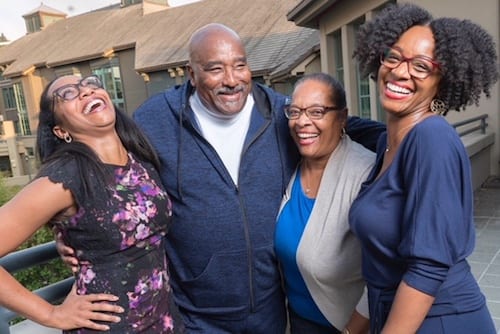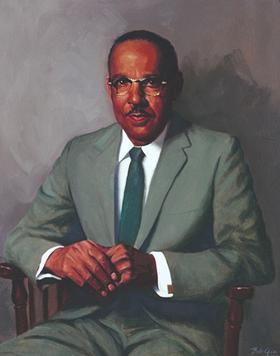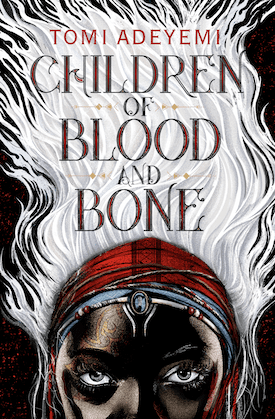In honor of Black History Month, we’re running a series of profiles and Q&As with members of the African-American community at Haas. Follow the series throughout February.

Haas lecturer Jennifer R. Cohen is gearing up to launch a course called “Equitable and Inclusive Leadership,” this summer. The elective is open to both Evening & Weekend and Executive MBA students. Cohen’s goal with the class is to present the data-driven benefits of diversity, equity, and inclusion (DEI) in the workplace, providing students with the language, concepts, insights, and tools to use DEI best practices in and out of work.
Data is key to Cohen, a scientist by training who holds a PhD from Johns Hopkins University School of Medicine in biochemistry, cellular, and molecular biology. Though she dreamed of being a scientist as a child, she said she found herself increasingly drawn to the idea of creating inclusive communities where underrepresented students felt safe and supported to do their best. That led to a career pivot. Most recently, she ran Oakland, Ca.-based SMASH, a STEM-intensive college preparatory and pipeline program for underrepresented high school students.
A service-focused family

Cohen grew up in the diverse Richmond and Portola neighborhoods of San Francisco, in a public service-focused family with her four sisters, attending the city’s public schools. One sister, Malia Cohen, formerly served on the San Francisco Board of Supervisors. Her father, Evered Cohen, was the ordained pastor of San Francisco’s Lutheran Church of our Savior in 2014.
“Growing up, Black History Month was something celebrated in our church and in our school assembly,” she said. “It felt like a reflection. It was very pageant-like and almost Halloween-like. You dressed up as Harriet Tubman and were replaying the underground railroad. It was similar to the talent portion of a pageant.”
Today, Cohen said she’d like to see the month be more centered on amplifying intentional love of the black community throughout the year, including events like Oakland’s Black Joy Parade, organized by Elisha Greenwell, which celebrates the black experience and the community’s contribution to cultures past, present, and future.
Breaking stereotypes
We spoke with Cohen about her heroes in the black community—there are many, including her parents, and public servants such as former First Lady Michelle Obama, Cohen’s sister, Malia, who is now chair of the California State Board of Equalization, and U.S. Senator and Democratic presidential candidate Kamala Harris, who, like Cohen, is a Howard University undergraduate alumna.
“I’m inspired by people whose passions and contributions break stereotypes,” Cohen said. “People who are activated. The creators and doers in our community.”
Here are a few more of Cohen’s heroes:

Vivien Thomas: Thomas was a heart surgery pioneer at Johns Hopkins during the 1940s. When Cohen was a graduate student, rumors spread among black students about a famed black man who had made a significant medical contributions to the hospital. She later learned that Thomas was a surgical technician, who did not have a medical degree, but nonetheless developed a procedure used to treat “blue baby syndrome,” working with a team to save babies from heart failure. “He was someone who was denied access to become a doctor, but that didn’t stop him,” Cohen said. “Countless lives were saved.” Cohen found Thomas’s framed photo in the basement of the hospital. The photo was later moved to the main floor, around the time that the film “Something the Lord Made,” was released, which recounts Thomas’ story. “He has a beautiful gold gilded frame now and that matters,” Cohen said. “I feel like that’s reflection of how we as a society are moving away from having our vast and significant contributions hidden in the proverbial basement to being showcased on the main floor.”
Henrietta Lacks: Lacks was an African American woman whose cancer cells are the source of the HeLa cell line, the first immortalized cell line and one of the most important cell lines in medical research today. “I would not have graduated or completed my PhD without HeLa cells,” Cohen said. As the founder of the Biomedical Scholars Association in Baltimore, a group that provides a support system for underrepresented minority scholars within the Hopkins community, Cohen brought local Baltimore middle and high-school  students into the research lab for hands-on STEM experiences. “I would tell them that your connection to science is right in front of your eyes. You are looking at the cells that came from a black woman from the Baltimore area.” An unknowingly heroic contributor to science and medicine, Lacks “teaches me the power of legacy and the impact we can make in the lives of people we’ve never met,” Cohen said. Some heroes are out in front like Oprah and Michelle Obama, Cohen said. “But with Henrietta Lacks it’s impossible to measure her impact, to monetize the impact of having her cells being harvested and grown all over the world to test for all kinds of diseases and to create cures for all kinds of diseases, including polio.”
students into the research lab for hands-on STEM experiences. “I would tell them that your connection to science is right in front of your eyes. You are looking at the cells that came from a black woman from the Baltimore area.” An unknowingly heroic contributor to science and medicine, Lacks “teaches me the power of legacy and the impact we can make in the lives of people we’ve never met,” Cohen said. Some heroes are out in front like Oprah and Michelle Obama, Cohen said. “But with Henrietta Lacks it’s impossible to measure her impact, to monetize the impact of having her cells being harvested and grown all over the world to test for all kinds of diseases and to create cures for all kinds of diseases, including polio.”
Tomi Adayemi: Adeyemi is a Nigerian-American author of young adult novels that are taking Afrofuturism into the mainstream. Her debut novel, “Children of Blood and Bone,” which is currently being made into a movie by Fox 2000/Temple Hill Productions, takes place somewhere that’s “like Wakanda with magic,” Cohen said. (Wakanda is the fictional African country in Marvel Comics’ “Black Panther.”) “When I escape I want to go to a place that’s an alternative reality for black people that sheds the legacy of slavery and oppression and presents blackness in our full glory and genius. So when I think about heroes, these are people who are creating that alternative,” Cohen said.